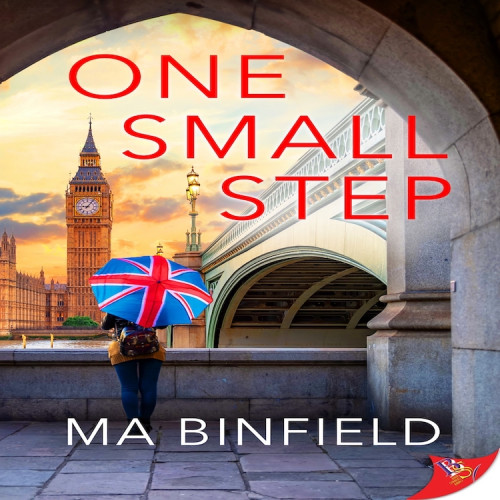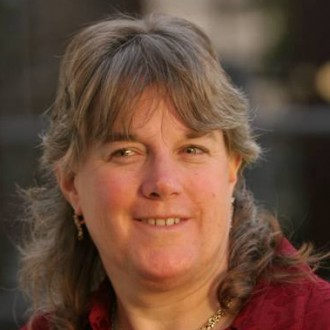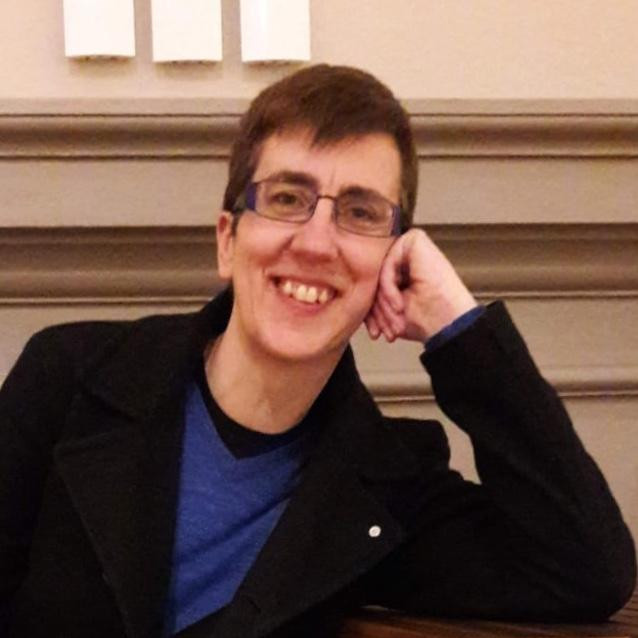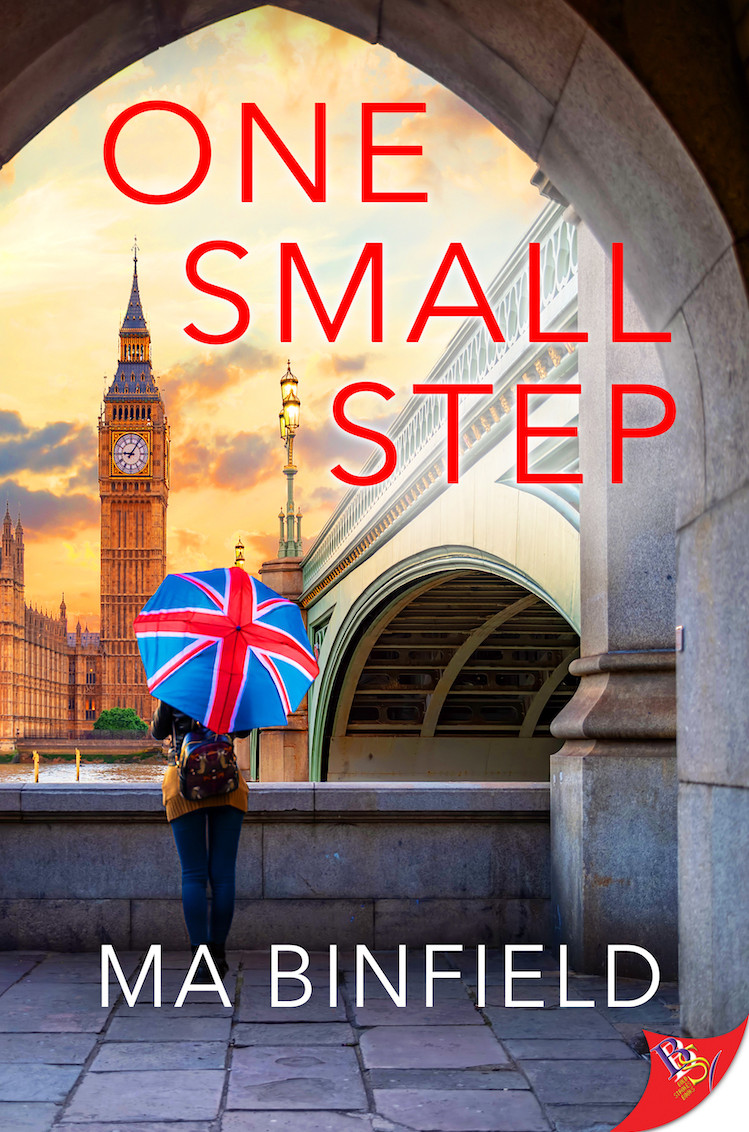Jeannie Levig interviews MA Binfield:
Hello, everyone, I’m here today to introduce one of our brand-new authors at Bold Strokes Books, MA Binfield. Thank you, Michelle, for joining us to talk about yourself and your writing. First of all, a huge congratulations on December’s release of your debut novel, One Small Step. How does it feel to be a published novelist, and how have you celebrated the publication of your first book?
It’s exciting and, at the same time, completely surreal. It’s the first novel I’ve ever written (to completion) and the first time I’ve ever sent anything off to get published, so I feel proud but incredibly lucky too. December was a crazy month in the UK because we had a general election which happened days after my book came out and, in a strange way, being active in the campaigning around that stopped me from obsessing too much and being too anxious about the release. I celebrated with a few friends who had far too much fun teasing me by reading out some of the racier passages until I begged them to stop.
Were the editing and production parts of having your book published what you expected, or were there some surprises for you? If there were surprises, what were they, and how did you deal with them?
I am a complete newbie so it was all a surprise! I was surprised how long it took overall from the manuscript being accepted to the date of publication. I had a lot of fun choosing the cover—I hadn’t realized that I’d have control over that. And—I should probably whisper it because I’m sure it gives away my naïve enthusiasm—I really enjoyed the editing process. I made a lot of rookie mistakes in my draft and was helped a lot by the wonderful Cindy Cresap, and it was so satisfying to feel the writing being strengthened by the editing process.
Was becoming a published author one of your dreams or a goal you set for your life, or was your path to this point and the journey it’s led you on more organic? What were some of the twists and turns it took along the way, if any?
Like a lot of people, I always wanted to write books and get them published. I remember dreaming about it as a teenager and even writing to Holly Johnson and offering to write his biography (he sent me a very polite refusal letter!), but I didn’t pursue writing very seriously.
I’m an avid reader, and I’ve written in spurts over the years—so many unfinished manuscripts and stories, so many creative writing classes—but life always got in the way, and the jobs I had were always so consuming. I took three months off work last summer determined to finish one of the manuscripts, and happily, I did, and with a bit of tweaking over the autumn, that became One Small Step!
What kind of writer are you? Are you a plotter or a pantser, or something in between? Do you start with characters or story in the development?
I’m definitely in between. I start with characters and a situation, and I write scenes. Randomly. Things I know happen between them, and the story evolves from there. I know it’s not particularly effective, and I do write a lot that doesn’t find its way into the final draft, but it’s an approach that works for me, especially at the start of a story. It helps me grow into the story and get to know my characters. As I get closer to the middle of a story, I find I need to plot more and make sure the story unfolds, and is told, at the right pace and with each of the main characters having the chance to tell the story from their point of view. I guess I start off as a pantser and become a plotter later on in the process.
You mentioned in our earlier conversation that being a Brit writing for a mostly American audience was a challenge for you, and I know BSB is picking up more and more British authors, so could you elaborate on what came up for you in facing that challenge?
Yes, it was a challenge. Not just the obvious things that I kind of knew we had different names for (car parks and parking lots, lifts and elevators, knickers and panties!) but one of the main characters is American, and I had to be really careful with her voice. She had to really seem and sound American. Luckily I had people who helped me with that, and like most Brits, I consume a lot of American books, films (movies!), and television programs, so that helps too.
I really enjoyed your writing style. It is comprehensive, adeptly and fully exploring the complexity of your characters’ emotional landscapes as well as setting an even and fluid pace for the telling of the story overall. Does this style come naturally to you, or is it something you’ve developed over time and other writing projects?
Thank you! I enjoy complexity. I think humans are more fascinating when we’re being weird and stubborn and insecure. And, for me, it definitely makes for a more interesting story (and a more satisfying happy ending!) when people aren’t doing or feeling straightforward things and take a while to find their happiness, or their truth. The pacing is something I was very aware of during the writing and editing, but like I said, this is my first real attempt at finishing a novel, so I guess I’m just fortunate that I have a good sense of it and it worked out well. I also had help from my editor, of course!
Is there anything you’d like to share about your writing style or process that we haven’t touched on?
Fun fact! (Maybe.) I write a minimum of four sides of A4 by hand every morning. I call them my morning pages. It’s a habit I picked up from a Julia Cameron book called The Artist’s Way. It’s supposed to be a way of clearing the mind first thing of whatever crap is in there and leaving you free to be more creative, but I began to use them for writing scenes in my novel. And there’s something about that process that really works for me. Sometimes, when I read back a scene written at that time a few days later to incorporate it into the manuscript, I don’t remember it or even recognize it, but I generally quite like the writing. It’s weird for me but maybe a common experience for other writers.
All right, it’s time to talk about your debut novel, One Small Step. I really enjoyed reading it. As a reader, I tend to like romances that are high in angst, but the pacing of such a book can be tricky to pull off as a writer. You found just the right balance so the story moved slowly enough to let the drama build while at the same time quickly enough to keep me turning the pages, eager to find out more. Very well done. And you’re clearly skilled at navigating the hills and valleys of a nice slow-burn romance. As you were writing One Small Step, were you conscious of these elements?
I wanted it to be angsty and I wanted it to be slow. I enjoy slow burn angsty romances as a reader, for sure. But I also wanted you to care enough to keep going. If I achieved that in any way, then I’m delighted! Partly it was a consequence of the two main characters’ personalities and the situation they were in—neither of them was exactly free to chase the other, to move things any faster. It’s tricky for them, and the potential fallout for them both meant they had to be sure about their feelings, sure not to get things wrong and cause hurt. But partly it was a conscious choice—true love isn’t something that, in my experience, is easily found and generally requires a bit of fighting for.
I know you are a football/soccer referee. Have you also been a player? And how much of your own experience with that entered into so much of Iris and Cameron’s interaction taking place within the dynamic of the team they both played on?
I played for a couple of teams in my twenties and thirties, and it was definitely helpful. The derelict dressing rooms, the cold showers, the camaraderie, the pub visits after a win (or a loss!) are all versions of my own experiences. We even had a swanky annual dinner dance once. My first memories of playing were in a team where almost everyone was coupled off with each other, and it made the dynamics fascinating. I’m pretty sure that domestic disharmony between two of the centre backs cost us a win one week…
I’m always interested in how authors meet their characters. Did Iris and Cam come to you fully developed, or did you build them as the story unfolded? Do you already know some of your characters for future books?
They came to me fairly well developed, but I discovered things about them—sometimes surprising things—during the course of writing the book. I didn’t know either of them at all, and they’re not based on anyone that I know, not even slightly, and I still don’t quite understand where they popped up from. I didn’t expect Iris to be a poet—I was surprised by that but also excited for her. I didn’t expect Cam’s courage—my admiration for her grew as the book progressed. I am definitely a character-driven writer, and I have lots of them around waiting for me to properly tell their stories—I just need to find time!
In addition to Iris and Cam playing on the same football team, they also share an interest in writing and reading poetry, which draws them even closer together. Does this element of their story draw on your own experience as a poet? Do you write poetry? Enjoy reading it? If so, would you elaborate on it some? If not, what led you to using poetry as such a strong draw between Iris and Cam?
I’m not a poet, though I massively admire those that write poetry and I enjoy reading it. I wrote a little for the book as you know, and it was nerve-racking. I had no sense of whether it worked or not. The first draft had a little more, but I took it out because I wasn’t confident it was good enough and I didn’t want to sell Iris short! I think I wanted Iris and Cam to have something that was very different to their work roles and very different to soccer, and them meeting at a poetry event suggested itself to me really early on, so I just stayed with it. I’ve never even been to a poetry slam, but those scenes in the bookstore so strongly evoked themselves to me that I trusted they were there for a reason.
I loved that you ventured into the sometimes rocky terrain of one of your characters already being in another relationship at the time she meets the other main and begins to develop feelings for her. Were there challenges for you in writing this aspect of the story? If so, what were they, and how did you approach them?
It was really important to make sure that neither Iris nor Cam behaved dishonestly. I felt that they were both better than that and it wouldn’t have felt very real if they had blithely jumped into bed with each other given the circumstances. Personally I find cheating pretty unforgivable. Getting it right is part of what makes the book so angsty of course because falling in love with someone in a relationship is never easy and always fraught. But I was also clear that they had something strong between them, something real, one of those once-in-a-lifetime loves that deserved a chance to thrive. It was tricky to balance, but I hope that it worked out well in the end. And, again, I was helped a lot with this during the editing process—Cindy challenged me to get it right, to honor all of those involved, not just Iris and Cam, and I hope we managed to do that.
There were a couple of secondary characters in the book that piqued my interest: Jess because she seemed so emotionally stuck where she was and Vicki because she was just fun. Any thoughts on either of them having their own book at some point?
Jess is a nightmare of contradictions—definitely stuck, brittle, mean, in love, and with a strange way of showing it. She was fun to write. I liked Vicki a lot too. She was so straightforward and honest and Cam (and the book!) needed her at times. No plans for either of them to have their own book—not in the near future anyway.
Is there anything else you’d like to talk about regarding One Small Step?
I’ve lived in London for a long time, and it can be a maddeningly stressful city, but it also has some beautiful parts and great qualities, and I really enjoyed the aspect of the book that involves Iris (a Londoner) showing Cam (a visitor from the US) the city. Running on Hampstead Heath, exploring cozy little British pubs with open fires, East End curries on Brick Lane. It was fun to share some of my favorite London places with readers through Iris and Cam’s time together in London.
Do you have anything else in the works? If so, what is it, and when can we expect it?
I am delighted to have just signed a two book contract with Bold Strokes Books for two new contemporary romances to be delivered in 2020. I’m excited to be able to introduce completely new sets of characters that I’ve been living with for a while!
Where can readers find you online?
And one last random question about you, just for fun. Knowing what you now know about yourself, what would you tell your fifteen-year-old self if you could go back and talk to her?
No, you haven’t stopped growing yet, but don’t worry, being tall isn’t as bad as you think it’s gonna be. And, no, it isn’t a phase, you’re always gonna find brunettes hot!
Michelle, thank you so much for taking the time to share yourself and your new book, One Small Step, with our wonderful Bold Strokes family of readers, writers, editors, and all the amazing BSB folks who make our books possible. I look forward to your future work.



